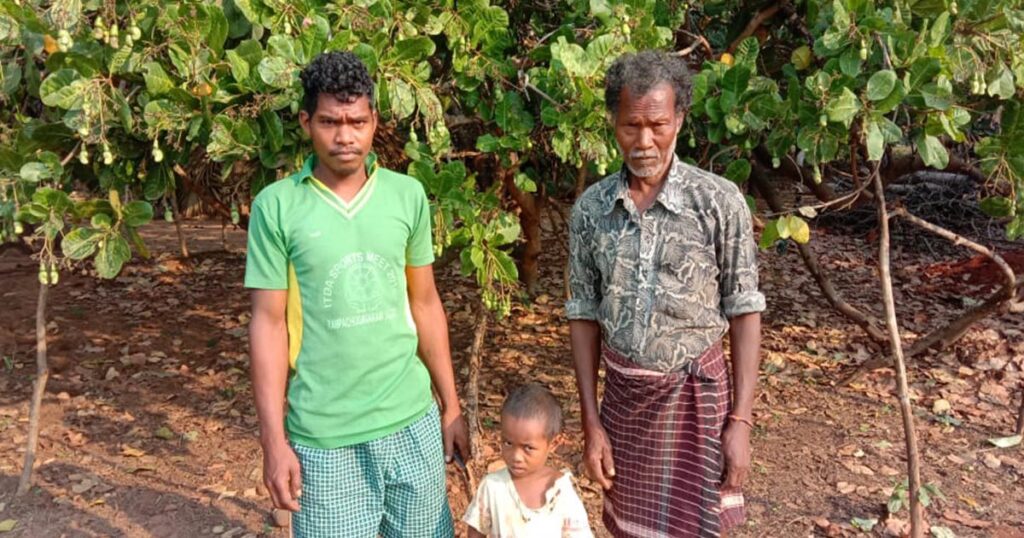By: Surender Taduri, Program Manager, Hyderabad, India

Kunjam Manganna Dora is a 67-year-old farmer belonging to a remote tribal village of Vedurlakoda of Addateegala Mandal in East Godavari district of Andhra Pradesh, India which comes under the Integrated Tribal Development Agency (ITDA). His village is far from the district headquarters and has limited access to transport, communication and even extension services.
He owns 1.5 acres of cashew orchard with 105 plants that are roughly 35 years old. He is a member of the Farmer Producer Organization (FPO) formed two years back by Digital Green’s implementation partner organization, Kovel Foundation.
“This cashew plantation is my family’s primary livelihood. Other than this we manage to gather some forest produce and in the peak of summer, I go to look for work under Mahatma Gandhi National Rural Employment Guarantee Scheme (MGNREGS) of the Government of India,” shared Kunjam whose approximate annual household income amounts to a meagre USD 600.
When I met this gentle old farmer, dressed in the traditional way of the tribal community he belonged to, I was surprised by the wealth of information he had to share about the cashew orchard. He was one of the 12 cashew farmers in this village that our partner had identified to work with under a project funded by Walmart Foundation, which aims to connect farmers with actionable information delivered through an automated system, called FarmStack, which develops these advisories from multiple sets of data, like information related to the crop, geography and soil and weather data all combined.
“Very rarely have we seen any government officers in our small habitation. When they come, that is to distribute pensions and grains under the Public Distribution System. I am not aware of extension officers and so far, no one has visited our fields for any crop-related suggestions,” shared Kunjam.
5 months ago, some people from Kovel Foundation and Digital Green organised a meeting with a group of 12 farmers and explained how we wanted to work with the FPO to share new knowledge related to cashew cultivation and undertake some activities such as soil sample collection, video dissemination, IVR calls and Farmers Field Schools (FFS).
“I was happy to hear about these initiatives and eager to participate and learn something new,” shared Kunjam.
“We all participated in soil sample collection, which was a tedious but interesting process. We then enrolled for the video disseminations and so far, we have watched 12 different practices related to cashew crop. We also enrolled for IVR calls but we faced some constraints as we don’t have good mobile network but our extension agent recorded those calls and played the audio clips during our group meetings,” he shared.
“As for the adoptions, we wanted to test the practices promoted, so we started preparing the Neemastram (an organic pesticide) and prepared 100 litres of it twice and applied it on the crops once during mid-December and again in the first week of January. We also prepared 300 litres of Panchagavya (organic fertilizer) and applied it on the crop 3 times and stored 50 litres to spray it later in two intervals – at the time of fruit setting,” shared Kunjam. He also built 15-inch-deep trenches around the twenty plants and filled dried leaves as mulch to help retain moisture – another best practice shared through the videos.
To test these practices, he selected 20 plants that had given a comparatively lower yield in the last season or those that were not flowering and fruiting for the last 3 years to apply the organic concoctions. “I was surprised and happy to observe that there was early flowering, and more flowering, early fruit setting and much less T-mosquito infection in those plants,” he shared. “The dried plants also rejuvenated and I observed new tender leaves in them,” he added.
These farmers had never used any chemical sprays on the orchard before but since last five years Kunjam has been applying Urea and DAP. This year too, he continued applying Urea and DAP to the rest of the plants. Kunjam and his fellow farmers faced difficulty in spraying the organic preparations as foot sprayers were not available anywhere around their villages. Recently, all the FPO members have requested the Integrated Tribal Development Agency (the local authorities) to make available required foot sprayers and drums.
Since our intervention started 60-70 days too late from the time when the agricultural season started, we had crossed a crucial period in the season wherein the farmers could have adopted, bush clearance, pruning, and also adopted Ghanajeevamrutham and Dravajeevamrutham practices which would have helped in increasing the soil fertility. Also, by the time we started introducing the practices of creating the organic concoctions that require huge amounts of water, the water ponds in the hill areas and village areas where the cashew orchards grow had dried up and carrying water from the village to farm was very tough but they showed great strength and determination to do this.
Looking at the orchard’s current condition, Kunjam and his family are expecting a better yield this year than the last year, that too with a lower expenditure. His family was thrilled about the opportunity to learn about managing the cashew orchard through the medium of videos. They would like to adopt these practices in all of their orchard in the next season. “I am also looking forward to share the Zero Budget Natural Farming practices with other farmers in my village,” added Kunjam.
